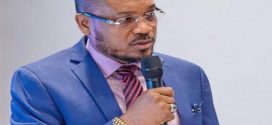The kidnapped Chibok girls were yesterday listed by the French Press agency , AFP, as among the most influential people of 2014.
Russian President Vladimir Putin tops the list in a year marked by seismic conflicts in Europe and the Middle East and scarred by episodes of extreme brutality.
The leader of the Islamic State group Abu Bakr al-Baghdadi also features prominently among the key personalities, reflecting the rise of militant groups with agendas even more radical than Al-Qaeda.
The extraordinary dignity showed in the face of deep suffering by the parents of murdered American journalist James Foley was also recognised in the list, which was compiled by senior editors after a consultation with more than 370 AFP journalists around the world.
Diane and John Foley never ceased campaigning for their son, an AFP contributor who was the first Western hostage to be executed by the Islamic State group. The horrific video of the killing was posted online and contributed to the outrage that brought the US military into the Iraq and Syria conflicts.
AFP last year published a list of the most influential people of 2013 led by Edward Snowden, who revealed the extent of US intelligence surveillance, Iranian President Hassan Rohani and Pakistani schoolgirl Malala Yousafzai, laureate of this year’s Nobel Peace Prize.
Here, in order, are the 10 people judged to have had the greatest influence on events in 2014:
VLADIMIR PUTIN: With the Ukrainian conflict and Russia’s annexation of the Crimean Peninsula, East-West relations have been plunged into their deepest crisis since the fall of the Berlin Wall. At 62, Putin is the key player in a confrontation that threatens to open a new Cold War.
ABU BAKR AL-BAGHDADI: The Iraqi leader of the Islamic State group, born in 1971, is at the heart of a major upheaval in the Middle East. He proclaimed himself caliph of the territory his fighters have overrun in Syria and Iraq, over which he reigns without mercy. A US-led coalition has been formed to confront him.
NIGERIAN SCHOOLGIRLS: The Boko Haram group kidnapped the 276 schoolgirls from Chibok,Borno State, in mid-April, shocking the world. On social networks, people launched a campaign, #bringbackourgirls. The girls became a symbol of the atrocities committed by the group, which has proclaimed its support for the Islamic State group. Of the kidnapped girls, 219 remain in the hands of Boko Haram with no sign of how, when or if they may be freed.
POPE FRANCIS: Chosen as pope in 2013, it quickly became clear that Jorge Bergoglio was a new style of pontiff. He confirmed that this year, reaching out to divorced couples albeit without taking any concrete steps. He has strongly defended Christians living in the Middle East and has urged Islam’s intellectual leaders to condemn jihadist violence.
MALALA YOUSAFZAI: The Pakistani teenager became a global icon after she was shot in the head and nearly killed by the Taliban on October 9, 2012 for insisting that girls had a right to education. At 17, this year she became the youngest Nobel Peace Prize winner in history, jointly awarded the honour alongside the Indian campaigner Kailash Satyarthi.
JOSHUA WONG: At 18, he is one of the faces of the pro-democracy movement that swept Hong Kong this year in defiance of the Chinese leadership. The “umbrella revolution” appears to have been halted or at least interrupted. But Joshua Wong and other leaders believe their demands for true democracy can no longer be ignored.
DIANE AND JOHN FOLEY: Their son, James Foley, an American freelance journalist kidnapped in Syria in November 2012, was the first Western hostage to be executed by the Islamic State group. During their son’s captivity, they were confronted by the US authorities’ categorical refusal to enter into any talks with his kidnappers. With courage and dignity, they have kept his memory alive.
OSCAR PISTORIUS: A Paralympics star, he was the main character in the trial of the year, a case that transfixed South Africa and television viewers around the world. Pistorius shot and killed his girlfriend Reeva Steenkamp in the early hours of Valentine’s Day 2013. After a televised trial, the judge sentenced him to jail for five years for manslaughter. Prosecutors have now appealed and are seeking a murder conviction.
THOMAS PIKETTY: The French economist’s weighty tome, Capital in the 21st Century, has racked up hundreds of thousands of sales in France, the United States and Britain, where his academic theories about growing economic inequality have struck a chord among readers. Along with this year’s Nobel Economics Prize laureate Jean Tirole, Piketty testifies to the vitality of economic thinking in France at a time when, paradoxically, the economy itself is in crisis.
JACK MA: The emblematic figure of Chinese entrepreneurship, Jack Ma is the founder of internet giant ALIBABA, which combines services similar to those of Amazon, eBay and Google. Alibaba shares began trading on Wall Street in September in the biggest listing in history. The 50-year-old former English teacher is the richest man in China.
 Hottestgistnaija.com
Hottestgistnaija.com





